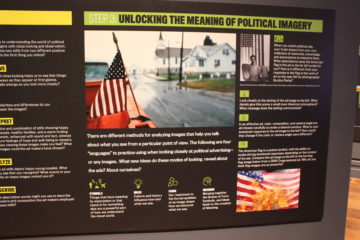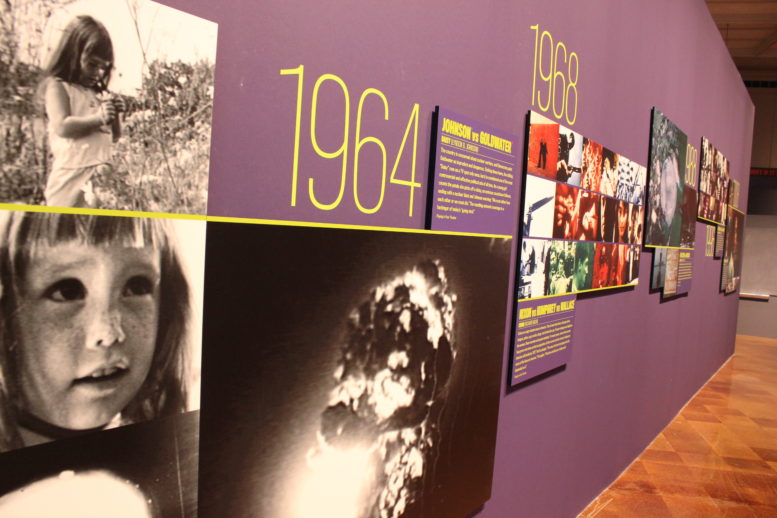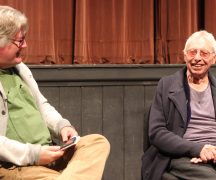By DAVID DUPONT
BG Independent News
As someone who began his political education at the family dinner table, walking through the Toledo Museum of Art’s exhibit “I Approve This Message: Decoding Political Ads” is like strolling through a chapter of my autobiography.
Politics made an early entry into my consciousness, and even the few election cycles beyond my actual memory – pretty much the Eisenhower campaigns – had a certain resonance. The elegantly dressed housewives with their crisp East Coast collegiate accents could have been sisters of June Cleaver, the mom on “Leave It To Beaver.” That Lena Dunham, the creator of “Girls,” pops on the screen right after in an ad built on a double entendre about losing her virginity and voting for the first time only highlights how much has changed. In a way. Listening to the issues – guns, poverty, crime, unemployment – that run through the discourse, a viewer would be right to despair about whether we’ve made any progress at all.
 But for exhibit creator Harriet Levin Balkind, the issues aren’t what matters when it comes to convincing voters how to cast their ballots. It’s all about emotion. Television advertisements are carefully crafted works of art intended to evoke those emotions.
But for exhibit creator Harriet Levin Balkind, the issues aren’t what matters when it comes to convincing voters how to cast their ballots. It’s all about emotion. Television advertisements are carefully crafted works of art intended to evoke those emotions.
The same tools used by artists, are used by political hucksters. That’s why, TMA Director Brian Kennedy said, the exhibit belongs in the museum. “We’re a museum that’s has always been predicated on art education. We’ve been about educating people to see through works of art, and political ads are works of art of a kind. It’s really important we understand them.”
With the Republican Party set to hold its convention in Ohio, and another presidential election underway the timing of the exhibit couldn’t be better.
“I Approve This Message” is the brainchild of Balkind, the founder of Honest Ads. An expert in brand marketing, she started her research into what drives people to vote in 2014 after her agency was sold.
What she found was people often vote for candidates who lie to them. This was behavior they would not accept from their spouses, kids, friends or co-workers. This was behavior that is illegal in advertising for consumer goods but is perfectly legal in political ads because of the First Amendment.
As she read about cognitive psychology, neuroscience and political science, she came to the conclusion that people don’t vote based on the issues, but on emotions. As they start to focus on the campaign and who to vote for late in the process, that’s when the attack ads really start to proliferate.
Even when presented with facts, our opinions are unshakeable, not just among those who are less educated, but also and even more so among the most educated, Balkind said.
As she synthesized these ideas, she thought of ways she could reach out to voters. She sought out avenues outside the usual political channels, libraries, schools, museums, where people really live.
Balkind discussed this with Adam Levine, an assistant director at the Toledo Museum and an expert in visual literacy, and together they brought “I Approve This Message” to fruition.
 The exhibit breaks down ads, looking at them through the lens of anger, fear, hope and pride —each emotion getting its own theater within the Canaday Gallery. In bold graphics, the exhibit dissects classic ads including the “Daisy” ad that was created by Lyndon Johnson’s campaign to attack Barry Goldwater and the “Willie Horton” ad used by George H.W. Bush to attack Michael Dukakis. These and other ads play on screens throughout the exhibit. The earliest is from 1952, a spot created by Disney for Eisenhower, with animated figures marching to a peppy tune. The latest are the televised volleys exchanged by Barack Obama and Mitt Romney in 2012.
The exhibit breaks down ads, looking at them through the lens of anger, fear, hope and pride —each emotion getting its own theater within the Canaday Gallery. In bold graphics, the exhibit dissects classic ads including the “Daisy” ad that was created by Lyndon Johnson’s campaign to attack Barry Goldwater and the “Willie Horton” ad used by George H.W. Bush to attack Michael Dukakis. These and other ads play on screens throughout the exhibit. The earliest is from 1952, a spot created by Disney for Eisenhower, with animated figures marching to a peppy tune. The latest are the televised volleys exchanged by Barack Obama and Mitt Romney in 2012.
The centerpiece of the exhibit is the Mood Room, an enclosed space in which viewers are bombarded with multiple images – children’s faces, soldiers in combat, majestic mountains, a dark, empty parking garage, fireworks and exploding bombs.
Balkind said she wants to “lift the veil on to how advertisers seek to influence you emotionally.”
She wants the exhibit to move visitors. “I never want them to look at a political ad in the same way. I want them to look at the ads and pull them apart. In doing that they’ll start questioning some of the things they’re thinking and be more critical thinkers and be able to talk about it more with their friends in a more civil way.”
Maybe that would make politics suitable dinner conversation again.
“I Approve This Message” runs through Election Day.
Support Local Media!





